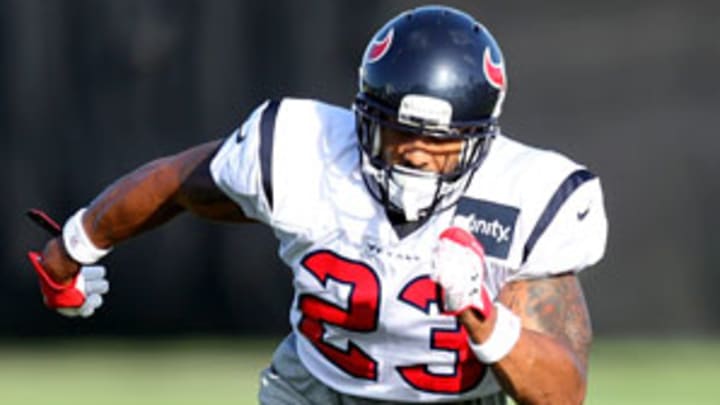Arian Foster says Twitter eliminates the middleman


Arian Foster can be found on Twitter here: @ArianFoster
How often do you check Twitter? Two or three times a day.
Who introduced you to Twitter? My business manager, Humble Lukanga.
Three people you follow in your sport? Vikings running back Adrian Peterson, Jaguars running back Maurice Jones-Drew, and Hall of Fame running back Barry Sanders.
Three people you wouldn't think I follow? Bill Maher, Nietzsche Quotes and TruSparta.
I wish ________ was on Twitter? My pops.
An athlete from history I wish was on Twitter? Muhammad Ali.
Last Twitter feud? Almost every day.
Through Twitter, I've become friends with _______? @jasennnnn, the winner of my Twitter contest; I treated he and his girlfriend, @SarahBethMarsh, to a Texans game and dinner.
Describe your Twitter followers? Eclectic.
******************************
I joined Twitter around 2009, my first year in the NFL. It was my business manager, Humble Lukanga, who said, "You should give this a try." I thought it was lame at first, another social media fad that was bound to flop. But the more I get into it, the more I think it's better than Facebook because of its simplicity. Twitter is an easy way to express your thoughts and feelings to the world.
The content that I put out there isn't necessarily for hardcore football fans. There are a lot of philosophical thoughts. I touch on religion. I touch on spirituality. I touch on a lot of different aspects that have nothing to do with football. I tweeted about my decision to go vegan, which I didn't think would get the reactions it got -- especially the negative ones. But I researched what I was doing, reached out to Tony Gonzalez, who went vegan for a bit. I felt like this was the best for myself.
Some people get turned off by my tweets, others get turned on. I've had people say, "I started following you for football and I'm continuing to because of the messages you're spreading." The more I use it, the more I enjoy writing, something I've always loved and do all the time. Twitter not only gives me an outlet to excerpt samples if I think there's a line or two that's powerful, or even something that I'm not necessarily gung-ho about, I'll tweet it but it also returns feedback instantly. Most of it has been positive.
Same goes for the connections I've made through Twitter, even when they don't necessarily start out that way. Recently, I was on a Southwest Airlines flight. There was a delay, and we were stuck on the runway for an hour with no air conditioning. This is in Houston, so it's humid and hot, and people are getting agitated. The situation didn't bother me; I know these things happen. But I have an irrepressible sense of humor, and I couldn't resist poking a little fun at Southwest anyway. I tweeted that Southwest was terrible and made a point of noting that I was tweeting from the runway, breaking the rules because I'm a rebel. Just joking around to pass the time. Finally, we take off and I forget about the whole exchange until we land. I check my timeline and see that Southwest actually tweeted me back, saying that it wasn't their policy to keep phones on [after pulling out of the gate]. It's a federal law, and they were sorry for the inconvenience.
After admitting that it wasn't ever a problem and that I was just joking, I told them again jokingly that 'if you're really sorry, you'll fly two of my fans out for a game. I'll get them tickets and put 'em up." They tweeted back and said that it sounded like a good idea. After exchanging direct messages, we turned the idea into a contest. Something like this only comes together on Twitter.
That's the great thing about the site: it cuts out the middleman, brings you directly to people. It also gives players a clear voice that cuts through our noisy media landscape. In particular, all-sports outlets like ESPN mostly highlight primetime players, and fans get spoon-fed whom they're supposed to like and not like. But Twitter gives them choices, like So-and-so might be an average player, might not get interviewed a lot, but I really enjoy his thoughts. What's more, it lets you set the record straight. You don't have to wait for a call from ESPN to clear something up. You can just put it out there directly.
The negative side is that sometimes words are taken out of context it's hard to express everything you want in 140 characters and things get misconstrued. So you just say it in another way. That's the funny thing about the English language. Most times, though, less is more.
